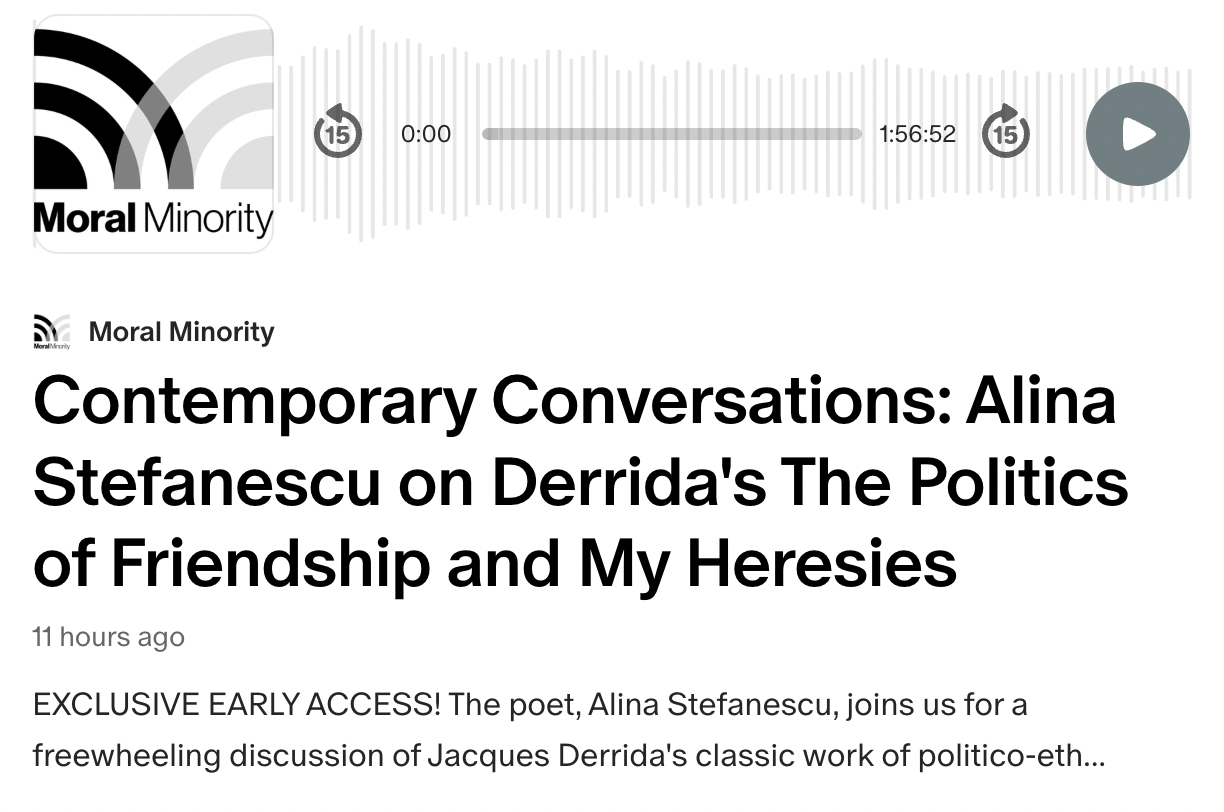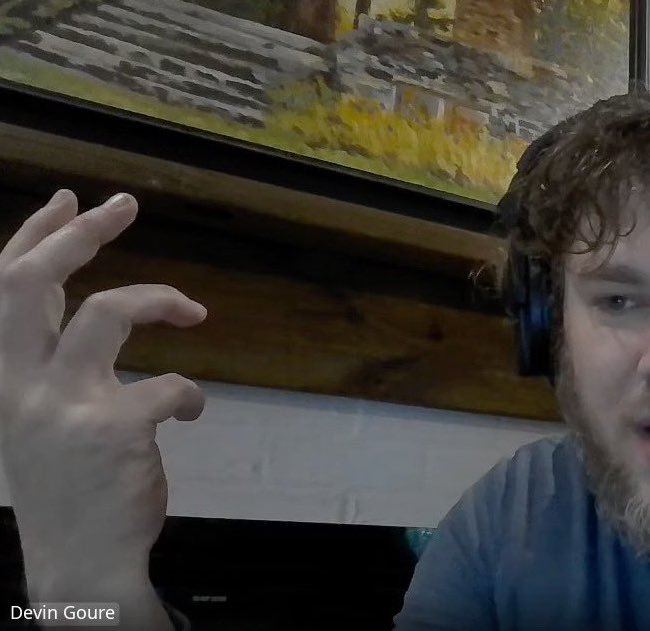“Speak of the devil, the devil appears . . .”
In celebration of minor keys, I must confess that only Moral Minority could convince me to compose myself for a 7 a.m. discussion of Derrida’s The Politics of Friendship.
To free my mind for lesser things, I will dump a few (disordered) notes here, with due regard for the strange objects that hovered above the table during our trialogue, including the (disorderly) angels and (disordering) demons of discourse.
1
Derrida sets the stage with the quoted apostrophe, that rhetorical gesture which invokes the absent friend, or calls them into being. Is this the posthumous being-with that recurs in his elegies? We hear the idea that quotations, or references to the words of friends, realizes (makes real, creates) a legend of “the two of them,” a “twosome that is kept in memory” and archived and preserved in Derrida’s writing on “the phantom friend returning.”
“Send me an angel,” to quote The Scorpions. Or: develop an expectancy capacious enough to handle Walter Benjamin’s Angelus Novus. Time, teleology, eschatology: this is the threshold where angel-angles enter. And so we must take seriously the unanswerable questions as part of theory.
What is an angel? So then, who is an angel?
2
When we speak of the devil, we construct him, or call the devil into being through myth, but we still have to reckon with our hunger for this myth, and our need to identify a diablo.
Theologists would say that identifying the devil enables us to protect our spirits, ourselves, and our loved ones from his influence; Carl Schmitt might say that the devil is the enemy we need for a working political theology where the friend or the beloved matters less than the construction of the enemy.
But naming is an act of intimacy: it binds us in relation to the named. To quote Derrida: “Everything in the political question of friendship seems to be suspended on the secret of a name. Will this name be published?” Surely Jacques/Jackie circled this question on tip-toe in Envois, which reminds me of the fantastic deconstruction of naming/claiming that occurs in I, Daniel: An Illegitimate Reading of Jacques Derrida's «Envois», by Jeremy Stewart, excerpted at Minor Literatures.
3
Inheritances aside, apostrophes in neon, it is hard not to feel for Lucifer, the promising star, the Icarus in each of us, the name of the being intended to fill the abstract container of “devil.” The devil is an Other, of course, so how do we recognize him? What are the structures, syntaxes, and shapes in which the devil apprehends us? Lot’s wife looked back: she sinned against the law of the Law-speaking God. Maybe she just wanted a moment to miss what she was abandoning: a community, a place, an ecology of relationships and meaning.
Enter the problematics of non-teleological intellections and gestures: it is impractical and lazy and useless to yearn. We are socialized to accept this at a young age, and poetry is a space where I have tried however fruitlessly to reckon with the radical, revolutionary potential of longing. Longing has always been dangerous precisely because it doesn’t know exactly what it wants: it feels-into wanting. It fumbles. What if longing, itself, is diabolically structured in relation to the possibility of the Fall? I mean: falling is the shape longing takes when it lets go. No monotheistic God ever “fell” in such a fashion. Falling, itself, is stigmatized by Lucifer’s fall. Don’t we follow the devil in our desires for questioning the patriarchal dominance of the law?
4
Deconstructionism offers another angle into the animating questions of philosophy. If this angle — this edge where light troubles linearity— feels generative for me, it is because the questions we can now remain political in their difference — political in their relation to the structures of sociality as administered by governments and discourses in the post-industrial era, political in their presentist challenges, political in their scale and grappling with duration, political in their poetics and rhetorical contracts, political in their election of who is included and who is deemed threatening.
5
Oath and promise are claims about the future self, but how much can we know about the self of tomorrow once we accept identity is fluid and complex?
What is a “promise” between friends? What can the between-ness “promise” outside itself, apart from the terrain it creates?
How is the construction of loyalty cross-cut by tensions between subjectivity (required to make a promise or give consent) and fidelity (which often refuses to exercise or make a subjective choice in the name of that very promise)?
The heartbeat or pulse of any claim is an ethical tension, a struggle, a contradiction. This is what it means to live the questions, to paraphrase Rainer Maria Rilke. Philosophy cannot live without poetry, and poetry cannot be without philosophy.
6
The last word should belong to the hauntologue himself, and so I quote from Derrida’s (I think) final interview, given as his pancreatic cancer was progressing, and published in Learning to Live Finally, where the titular “finally” hovers about the page:
Postscript: Charles took these screen-shots of our hand gestures which appear as a sort of paratextual visual triptych to our conversation — either an addenda to the original text or perhaps even the sort of footnote that becomes its own book, the sort of provocation that Derridada could never resist.




